 |
|||||||||
Classical Editor: Rob Barnett
Music Webmaster
Len Mullenger:
Len@musicweb-international.com
|
Classical Editor: Rob Barnett
Music Webmaster |
|||||||||||||||||||||||||||||||||||||||||||||
Classical Editor: Rob Barnett, Spoken Word Editor :Gerald Fenech, Reviewers: Rob Barnett, Ian Lace, Len Mullenger, and: Richard Adams, Terry Barfoot, Arthur Butterworth, Paul Conway, Gary Dalkin, Andy Daly, Tony Duggan, Gerald Fenech, Lewis Foreman, David Frieze, Malcolm Galloway, Ian Marchant, Humphrey Smith, Philip Scowcroft, Colin Scott Sutherland, Andrew Seivewright, Richard Whitehouse, Reg Williamson, Peter Grahame Woolf, David Wright. A complete list of contributors can be seen here
March 2000 part 4 |
[Part 1]
[Part 2] [Part 3] [Part 4] [thumbnails] |
For those wishing
to print the reviews there are continuously scrolling texts
without CD cover graphics
here
© Music on the Web(UK) 2000. All rights retained. Reviewers retain
copyright on their reviews.
Disclaimer
ENGLISH LUTE SONGS. Works by: Purcell, Lawes, Dowland, Locke, Blow etc. Robin Blaze: countertenor, Elizabeth Kenny: lute
Hyperion CDA67126 71m DDD.
Save around 22% with
the retailers listed alongside
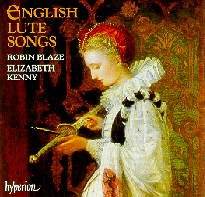
The exquisite combination of counter-tenor and lute is a remarkable marriage of beauty and harmony. It takes an enterprising company like Hyperion to issue such a ravishing disc and after repeated listenings, I have nothing but praise for the project as a whole. There are thirty tracks in this well-filled CD clocking in at just over seventy minutes coming from a plethora of composers such as the ever-present Henry Purcell and the relatively obscure John Danyel. There are also a few lute solos with Purcell's famous 'Riggadoon' particularly enticingly played by Elizabeth Kenny. Robin Blaze could be portrayed as the countertenor of the moment and his singing cannot be faulted with a secure range and effortless transitions from bawdy to serious text. There are not many masterpieces; this is essentially just enjoyable music but Purcell's 'By beauteous softness' is particularly enchanting and holds dramatic depth especially in the final lines. Dowland's music is searching and involved especially 'In darkness let me dwell' whilst the easygoing charm of John Banister's 'Dry these eyes' makes for a refreshing alternative. The longest item by far is obviously John Danyel's 'Can doleful notes?', seven minutes of delicacy and intricate beauty that is quite enchanting. There is also space for works by William Lawes and Pietro Reggi, the latter another Italian settler in England. Full texts and extensive notes by the lutenist herself are an essential part of the package. Those who have listened to 'The Noble Bass Viol' will perhaps know what to expect and I cannot but heartily recommend this disc to the lover of the genre, it certainly provided a happy and peaceful afternoon's listening for me!
Reviewer
Gerald Fenech
Performance:

Sound:

ENGLISH STRING MINIATURES: "Summer Stream": Alan Langford: Four Pieces; Geoffrey Bush: Pertimento; Geoffrey Wright: Two Pieces; Herbert Sumsion: A Mountain Tune; David Lyon: Intermezzo; Anthony Hedges: Pertimento. Royal Ballet Sinfonia/David Lloyd-Jones
ASV CD WHL 2121
Save around 22% with
the retailers listed alongside
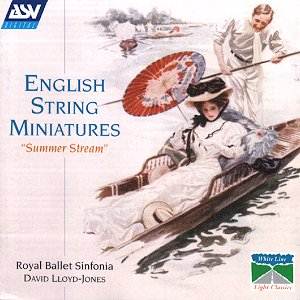
This CD is another winner from ASV whose previous releases in the "White Line Light Classics" series have included Addinsell film music, Horovitz orchestral music and a valuable selection of previously unavailable British orchestral miniatures (CD WHL 2113).
The disc begins with Four Pieces by Alan Langford. These consist of a suave waltz, an attractive pizzicato perpetuo (an alternative to the oft-performed "playful pizzicato" of Britten's Simple Symphony perhaps?), a Pastoral with its roots deep into the English tradition and finally a scuttling scherzetto which tests the string ensemble to the limits of their virtuosity.
Geoffrey Bush's three-movement Pertimento is much more serious in vein as is immediately apparent from the more advanced harmonic language of the opening Deciso. The central Lento, ma non troppo is vibrant and passionate and reminds us what a sad loss to British music the death of this composer was in 1997. The Finale looks back to a previous age with the ebullience and joy of Tippett's Suite for the Birthday of Prince Charles.
Two very appealing short pieces for strings and harp by Geoffrey Wright follow, the second of which, Cock-a doodle Dandy, is as wittily scored as its name suggests. Herbert Sumsion's A Mountain Tune has a memorable cello theme at its core and David Lyon's Intermezzo is a brief but entertaining gem.
The disc ends with Anthony Hedges' Pertimento. The highly inPidual voice of the composer makes its mark straight away in the main theme of the opening Allegro moderato. The profound second movement is deeply felt by the players whilst the quicksilver Finale's throwaway ending is perfectly judged.
This is a most attractive and lovingly compiled disc which brings to light new treasures from the vaults of British light music. The most substantial works, both in terms of length and musical substance are the two Pertimenti and these receive special care in their performances, repaying further listening. Highly recommended.
Reviewer
Paul Conway

TORTELIER'S FRENCH BONBONS: Works by Hérold, Gounod, Thomas, Massenet, Adam, Chabrier, Auber, Offenbach and Maillart BBC Philharmonic/Yan Pascal Tortelier
Chandos CHAN 9765 [75' 08'']
Save around 22% with
the retailers listed alongside
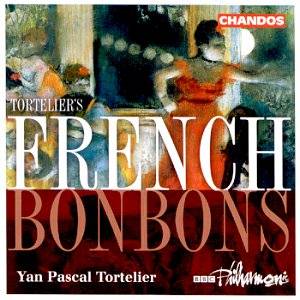
If Louis Frémaux made the CBSO the best French orchestra outside France in the 1970s, Yan Pascal Tortelier has been instigating a similar transformation in Manchester with the BBC Philharmonic. Having made distinguished Chandos recordings of works by such Perse French composers as Messiaen, Roussel, Lalo, Dutilleux, Chausson and Boulanger, it is good to see the BBC Philharmonic under their principal conductor tackling the lighter side of the Gallic repertoire. This is Beecham territory (a fact acknowledged by the use of the word "bonbons" in the title of the disc) and if there is an occasional want of Beecham flair and charm in some of the phrasing, the Chandos release more than makes up for it in the high standard of the orchestral playing, the excellent recording quality and the unflagging sense of fun and enjoyment in music-making demonstrated by the BBC Phil and Tortelier.
The disc begins with a sovereign account of Ferdinand Hérold's boisterous Zampa Overture and ends with a suitably swaggering version of Chabrier's "Joyeuse marche". There is a pleasing mix of the familiar (Massenet's Méditation from "Thaïs", Offenbach's Barcarolle from "The Tales of Hoffman" and Gounod's sardonic "Funeral march of a marionette"), the less familiar (Auber's witty overture to "Le Cheval de bronze" and the charming Gavotte from Ambroise Thomas's "Mignon") and the downright unfamiliar (Aimé Louis Maillart's melodramatic overture to "Les Dragons de Villars"). The CD is a well-chosen selection of overtures interspersed with shorter items, all of which Tortelier keeps moving at a cracking pace so that there is no hint of indulgence in the performances. If the BBC orchestra doesn't always sound particularly "French" (Willi Boskovsky with the Monte Carlo orchestra would be the other side of the coin from Tortelier's interpretations!), there are gains to be had from a more "cosmopolitan" approach, not least in the suave sophistication of the playing (the horns in Chabrier's "Marche joyeuse" don't so much whoop as trill gracefully).
The disc partially replicates a Decca Ovation release (425 083-2) with L'Orchestre de la Suisse Romande under Ernest Ansermet which includes the overtures to Zampa, Mignon and La Belle Hélène. The Chandos performances are much more polished, although it must be said that the Swiss players convey a greater sense of the hurly-burly of the orchestral pit in their brash enthusiasm. The Royal Liverpool Philharmonic Choir makes a brief but telling appearance on the disc in the Offenbach Barcarolle and the leader of the BBC Philharmonic, Yuri Torchinsky, brings a refreshing spontaneity to the Méditation from "Thaïs" (taken at a flowing tempo and thankfully devoid of cloying sentimentality).
This is a worthwhile CD, bringing together some very attractive French miniatures. However, just as a surfeit of bonbons can induce a feeling of nausea if too many are consumed at once, so I would recommend dipping into this selection on repeated hearings rather than listening from beginning to end every time! Now that most orchestral concerts have given up on encores (perhaps due to the constant programming of late-19th/early 20th century symphonic heavyweights), it is all the more valuable to have an opportunity to hear these well-orchestrated tuneful works. I hope there will be more discs of similar repertoire to come from these artists - it is rare to find "light" music invested with such care and affection.
Reviewer
Paul Conway

Charlotte CHURCH Various songs and arias SONY SK89003
Save around 22% with
the retailers listed alongside
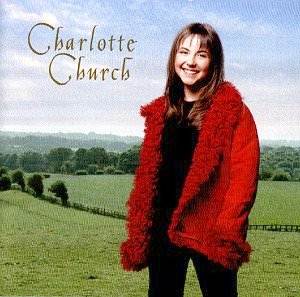
I will deal with the items on this CD first.
The so-called Ford Global Anthem Just Way Hello by Danny Beckerman is a ghastly song.... unoriginal, and often sounding like Just The Way We Were, slushy, cheap, trite, banal and nauseating. It is akin to a poorly constructed pop song trying to be important. The final vocal reiterations on two notes and a clattering percussion part is really quite awful and embarrassingly so.
La Pastorella from Soirees Musicales by Rossini needs an excellent technique. Charlotte's voice is truly lovely but her tone is unequal. Her middle range notes are disappointing... .or is this a recording flaw? Yet her high notes are very exciting. But, sadly, she has already developed that awful habit of prima donnas the slur, glissando or swoop from high notes. This portamento is ugly, whoever does it.
Offenbach's Barcarolle is somewhat under-sung but, at times, is desperately beautiful.
When we come to the two operatic arias by Puccini and Handel the depth and maturity is sadly lacking particularly in the florid aria from Rinaldo. Of course, one does not expect maturity from a winsome, delightful thirteen year old and, in fact, we are glad that she is singing this material rather than trash alla Robbie Williams or Elton John.
But these arias show up where the voice's register changes. This is noticeable and is one example of lack of technique. She also clips short some of her notes.
The great Welsh hymn, Cwm Rhondda, and the march Men of Harlech are very evocative and yet another reminder that we Welsh have the finest voices (!). It is in this direct style that Charlotte excels.
But the problems are there. The arrangements, which, of course, are not Charlotte's, are naff with the exception of Sir Charles Mackerras's version of Dvorak's sumptuous Songs My Mother Taught Me. And the conducting and subsequent performances are very poor at times. For example, The Holy City suffers from some absurd changes of tempo including the ridiculous speeding-up of the last line of the verses. Some of the orchestration is so bad that it recalls Elgar. Martini's Plaisir d'amour has a very heavy orchestral bass and some curious changes of tempo and hence both its simplicity and appeal is lost. Gershwin's Summertime is a showpiece and, sung well, is marvellously evocative as Judith Buckle has shown us. But Charlotte's first entry is uncertain and, again, the orchestra is too heavy and this is a pity for Charlotte has the measure of this wonderful song.
It is in the folk songs that Charlotte shows her best interpretations. The tempo for the Mozart aria is a shade too fast and, as a consequence, It sounds cheap and, again, the bass is too heavy.
I could comment on the other items but I would be repeating myself. It is difficult to review this disc. I feel Charlotte is being pushed, processed and packaged. Her advisors' choice of material is not always the best and the arrangements are embarrassing.
She has received too much unhealthy hype. That she has appeared before the Queen and Bill Clinton tells us nothing about her talent. Linda and I had Oat Krunchies for breakfast and have met Gregory Peck.... so what?
Charlotte has a splendid voice and we should be thankful that she is not singing rubbish ..... well, she does, occasionally. But I fear for her in that she may become a type of 'pop star', a teenage personality, and be exploited and, perhaps burn out and become a psychological wreck as did the sadly lamented Jacqueline du Pré. 1 say this graciously and courteously.
She should pursue songs which suit her voice, range and stage of maturity and sing without the excesses of style and tempo and in different arrangements and, recording engineers, cut the bass.
I will refrain from 'awarding stars' as to the recording and performances.
I wish Charlotte well but she needs better guidance and to work with people who are more professional and musical with a sure classical tradition.
Some people will ignore all of this and say that this CD has sold well and thereby imply its perfection.
Reviewer
David Wright
RADIO CLASSICS Various composers and orchestras HMV CLASSICS 5 73550 2
Save around 22% with
the retailers listed alongside
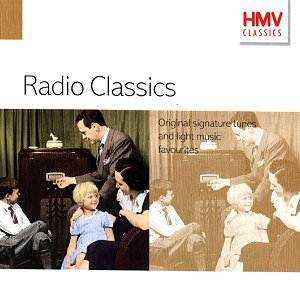
Yet another welcome light music compilation from EMI's vaults: 21 tracks dating from 1933-70. Eric Coates is represented by three pieces (but he was especially popular as a source for radio signature tunes), Robert Farnon and Sidney Torch by two each; of the 14 others, most are very familiar from other compilations, though a few, like JohnFortis' Dancer at the Fair, Woolf Phillips' Parisian Mode and maybe Clive Richardson's "trainpiece" Running Off the Rails and Donald Phillips' Skyscraper Fantasy, are rather less well known nowadays, however popular they were in British light music's palmy days. On this CD Charles Williams, Eric Coates, George Melachrino, Sidney Torch, Ray Martin and Woolf Phillips figure both as composers and conductors. The transfers are well managed.
Reviewer
Phil Scowcroft

RENAISSANCE MASTERPIECES Oxford Camerata, Jeremy Summerly
Naxos 8.550843 [DDD] [69'01]
Save around 22% with
the retailers listed alongside
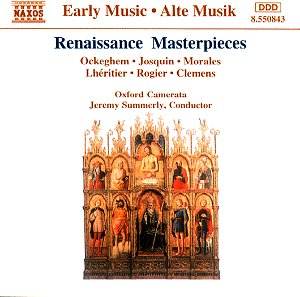
Intemarata Des Mater
Nunc Dimittis
Magnificat (Octavi toni)
Surrexit pastor bonus
Laboravi in gemitu meo
Ego flos campi
Si ignoras te
Lauda mater ecclesia
Vadam at circiubo
Laudibus in sanctis
Crux fidelisOckegham
attrib. Desprez
Cristobal de Morales
Jean Uneritrer
Philippe Rogier
Jacob Clemens
Palestrina
Lassus
Victoria
Byrd
King Joao IV
I would question the use of the word 'masterpiece'. It is an over-used and abused word. If the truth were known there are very few masterpieces in the whole history of music and while it is said that many so-called great composers have written masterpieces a detailed examination of their skill, craftsmanship and technique may prove otherwise.
The value of this disc is that it gives us a welcome slice of history. As with music of this period it all sounds very much the same and can become tedious as a result.What has to be said is that the performances are simply exquisite. A very lovely sound.
All the music is, however, slow and there is little contrast. But this is how music of the Latin liturgy was at the time. The technical skill of the composers is not questioned but, as the sleeve note states, the music is entirely functional.
You should investigate this disc and delight in the music's obvious sincerity. Seldom is there any emotional content or depth but that could also be said of a lot of music throughout the centuries.
Whilst I am not in favour of flippancy in church music or worship and deplore the Pentecostal and charismatic music of the last 50 years or so, I do think that this renaissance music errs a shade too far the other way.
It reminds me of that wonderful story... .and a true one... .of the conversation that Sir Hubert Parry had with Sir Charles Villiers Stanford after a performance of Elgar's Dream Of Gerontius. One remarked, "It stinks of incense." to which the other replied, "Oh, no, it doesn't. It just stinks."
One can sense the incense and the vast forbidding churches where these renaissance works would have been heard. I am not sure that the music reflects the severity of Catholicism of the time or the dignity due to God.
And as for the gem in this disc, it must be the Magnificat by Cristobel de Morales. It was truly spiritually uplifting. Simply gorgeous
Reviewer
David Wright
Performances

Recordings

OF KNIGHTS AND CASTLES Sinfonia of Cambridge Brass Ensemble/Russell Keable
DUNELM RECORDS DRD 0141
(from 2 Park Close, Glossop, Derbyshire SK13 7RQ)
Save around 22% with
the retailers listed alongside

This is a recording of a live concert given in Great St. Mary's Church Cambridge and has the disadvantages (the inability to correct wrong notes and difficulties in placing microphones) and advantages (summed up by the words "spontaneity" and "adrenaline") of recordings of live music-making. The music ranges widely from Bach and Gabrieli to Dukas, Copland and Flor Peeters and includes several British items, most interesting of which is Ian Milnes' Brass Sextet (1972). A few years ago I received a two disc issue of his music, also from Dunelm, which included a primitive recording (not made originally by Dunelm) of the Sextet, which is now confirmed as an attractive, basically tonal 10 minute piece in three movements full of good tunes, admirably worked. The outer movements have an infectious rhythmic vibrancy, the middle one neatly contrasts the trumpets with trombones and tuba. It should be better known. We also have here Britten's intricate Fanfare for St. Edmundsbury and two suites, Jim Parker's A Londoner in New York and the late Raymond Premru's Pertimento, both written for the Philip Jones Brass Ensemble, both brilliantly written (the CD's title derives from one of Premru's movements) and both eclectic in idiom, juxtaposing various aspects of jazz and mainstream "modern Classical" (Parker's "Grand Central" is superb "train Music"). Playing is generally good, though intonation is sadly awry in Elgar Howarth's arrangement of Handel's Firework Music and the recording is admirably clear. This attractively presented release is worth investigating.
Reviewer
Phil Scowcroft

Collection: The Land of Mountain and Flood - Scottish Orchestral Music Royal Ballet Sinfonia conducted by John Wilson
ASV CD WHL 2123 [70:46]

They say the Devil has all the best tunes. When one thinks of the gloriously lyrical melodies of such favourites as 'Loch Lomond', 'The Road to the Isles' and the 'Eriskay Love Lilt' there is little doubt that the soulful Scot, obviously in league with the devil, has music in his make-up somewhere! What if it is often marked by a kind of poignant yearning that many take for sentimentality. Dvorak and Smetana sang no less soulfully.
This present disc, with such an opening as Hamish MacCunn's 'Land of the Mountain and the Flood' (and including a welcome orchestration of his evocative 'Highland Memories' suite) surely underlines this in no uncertain manner. One wonders then just why it should take an English orchestra, a Geordie, and a cosmopolitan Londoner to compile this present selection, and, with perhaps just a trace apologetically, (not patronising ) think of it as 'light' music. Occasional music it may be, even ceremonial, but the 'big tunes' (played here perhaps a very little on the fast side) are 'singing in the bath' material - and its frivolities (such as Marcus Dods' delightful oboe caprice 'Highland Fancy') are made of music of considerable distinction. A far cry from MacMillan and Beamish perhaps? Of the two more substantial works MacCunn's great ballad needs no introduction. But it is some time since we heard the luscious music of Cedric Thorpe Davie's 'Royal Mile' march, to the strains of which the Royal party, on a coronation visit to the capital in 1952 left St Giles - and whose great central melody (the tune Molly Stewart) was, said Edward Greenfield in the 'Guardian' like 'Walton in a kilt', a tune that brings back for me fond memories of 'The Highland Fair' at the Edinburgh Festival of that year.
Yet perhaps it is not so long ago since we heard Thorpe Davie's music - for those of us who watched the recent television screening of Disney's 'Kidnapped' without noticing the screen credits.....? It is perhaps worth noting that Cedric's film music alone (never mind music for some fifty radio and TV productions) occupied over one thousand pages of full score! Light music - perhaps, but serious work! However I have no real quarrel with the classification if it allows us to hear tuneful music of the calibre of this selection.
Ian Hamilton, one of the 'wild geese' who fled from his native land, is not forgetful of the potential of the dances and melodies of Scotland - these more exciting to me than Malcolm Arnold's. Here is a Glaswegian 'West Side Story' or perhaps 'Slaughter on Sauchiehall Street' with a tipsy Duncam Gray, a raucous whistled wooing of a 'love who's but a lassie yet' - a jolly 'quodlibet' and a lento full of Scotch mist. Buxton Orr takes a much more serious view of the Celtic element with a Fanfare and Processional curiously described as a 'piece of brass writing for strings', and a Suite whose final Port-a -beul (mouth music) also reflects the occasional work song of the Highlands. Perhaps the strangest element is the inclusion of a richly-scored strings version of Sir Hugh Roberton's perennial "All in the April Evening' with its decidedly weird 'tremolando' passage evoking the stark landscape of the crucifixion. What would the Women's Guild have made of it?
The lightest music on the disc comes from Muir Mathieson's impressionistic, even visual, set of Highland cameos - depicting in good film score style, the vistas of the Isles (the call of the mystical Tir-nan-Og) and the crystal stream trickling over Glengarry's rocks (scarcely a Scottish Vltava)
Philip Lane's informative sleeve notes are excellent - but marred by a few 'howlers' - MacCunn's opera is 'Jeanie Deans' (not 'Downs') - Gaddie should be Gadie and surely it isn't necessary to translate '0 gin I were ehere Gadie rins'?? Duncan Grey should of course be Duncan Gray -proofing errors? But I carp! This disc will leave many a listener (on his way to the bath?) singing joyously!
Can I suggest very strongly, for a future disc from this excellent company, Cedric Thorpe Davie's 'The Jolly Beggars', Alexander Campbell Mackenzie's 'Benedictus', the Overture 'Renaissance' by Francis George Scott and the exhilarating 'Scots Dance Toccata' of Ronald Stevenson.
Reviewer
Colin Scott-Sutherland
See also earlier review by Ian Lace
THE ROMANTIC CELLO: Sonatas by PARRY and HURLSTONE, pieces by HARTY Andrew Fuller (cello), Michael Dussek (piano)
DDD DUTTON CDLX 7102
Save around 22% with
the retailers listed alongside
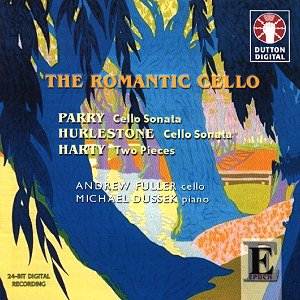
.
Dutton is primarily known for its first-rate refurbishment's of older recordings but this issue shows it is also excellent work in the "first recording" field as well. In short this is a delightful disc. Hubert Parry's Sonata in A is early by his standards, dating from 1879 and not published until 1883, but it has a most appealing breadth and not a little of Parry's characteristic grand manner. The middle movement, the shortest of the three, is perhaps the works high point, its lyricism beautifully sustained. Hurlstone (the CD cover carelessly misspells his name) died in 1906 at the age of 30, a great loss to British music on the strength of this Sonata, not to mention other significant works. In four movements, its writer is gloriously fluent for both cello and piano, though never superficial, even if there is less sadness in the Adagio Lamentoso than we might expect. Harty's two pairs of pieces, Romance and Scherzo, Opus 8 and Waldesstille and Schmetterling (Butterflies), both appeared early in his output and were intended for W.H. Squire. The latter pair, from 1907, four years after Romance and Scherzo are rather the better, Waldesstille more subtle than the Romance, Schmetterling more concise and more inPidual than the Scherzo but all are worth reviving. In Andrew Fuller they - and the Parry and Hurlstone sonatas, too - find an excellent advocate, clean and lyrical in tone, and the very experienced Michael Dussek is a thoughtful, responsive accomplice. The recording is predictably fine; I have had much pleasure from this CD and invite other to share it.
Reviewer
Phil Scowcroft

WHALE SPIRIT RISING: MARJAN MOZETICH Fantasia .. sul linguaggio perduto for string orchestra (1981) 14.16 BRIAN ELLIAS Whale Spirit Rising for strings and baritone saxophone (1985) 26.24 KEITH JARRETT Elegy for violin and string orchestra (1985) 18.28 
Eleonora Turovsky (violin) David Mott (sax) I Musici de Montreal/Yuli Turovskyrec Canada 1996-1997 CHANDOS NEW DIRECTION CHAN 9748 [59.18]
Save around 22% with
the retailers listed alongside

The names may be unfamiliar but the musical language of these three is welcoming.
Mozetich is Italian-born (1948) but lives and was musically trained in Canada. His string fantasy is very easy to like. Its consonant string undulations weave and melt in ecstatic fervour. Tippett, Wirén and Bernard Herrmann are familiar voices suggested by the warm melt, merge and collision of this music. If you enjoyed Peteris Vasks' string symphony or Tippett's Corelli Fantasia you will want this.
Whale Rising takes whale song as its point of reference. The song of the whale has been closely studied by Ellias (b.1949) and is a constant throughout the work. Elements of that strange language underpin and lift the music. It is most clearly heard in the voice of David Mott's saxophone. Mott by the way gives a sensationally virtuosic performance showing that John Harle does not have the field to himself. The piece rises from a very deep but quiet bass canon among the strings. It is unhurried, lugubrious and moves in direct evocation of the stilly night of the deeps. The saxophone runs the gamut of sounds to be extracted from the instrument. The pain and mewling ecstasy of the climax at 21.12 is notably moving.
Keith Jarrett is a denizen of the jazz realms but has never taken the amorphous boundaries of that world as a limitation. He moves as a free agent. He has several orchestral works to his credit and is familiar to classical enthusiasts from his Bach performances. The Elegy is the easiest of these three accessible new works. It has little drama inhabiting a cosmos similar to that of the string music of Finzi. Essentially this is one long pensive lento with none of the angularity of Shostakovich. The smooth transit of the strings and the closely (but not oppressively) recorded solo violin has a Bach-like sense of peace. Eleonora Turovsky's violinistic voice traces the beloved outlines with caressing tone.
A tendency to monotony is avoided by the presence of the slightly more challenging Ellias piece. The Jarrett and Mozetich are at one level rather alike although the former is more inventive and eventful.
Three works from the school of new melodics, suspensefully played and lovingly recorded will appeal to all who have discovered the new tunefulness of Hovhaness, Pärt, Nyman, Silvestrov, Rautavaara and Vasks. Contemporary music is not difficult and is much broader and more varied than the prejudices built up in reaction to years of Xenakis, Ferneyhough and Birtwistle might suggest.
Reviewer
Rob Barnett

HOPE AND GLORY: Soundtrack to the TV series Music by: Bach, Mozart, Beethoven, Haydn, Pachelbel, Wagner etc. Various Orchestras and conductors.
BBC WMSF 6014-2 70m DDD.
Save around 22% with
the retailers listed alongside

'Hope & Glory' is one of the best series around at the moment (although we don't get much of it down here in Malta!) not least owing to its colourful and engaging music drawn mainly from the mainstream classical repertoire. We have all had the experience of a tune lodging involuntarily in our minds so the idea of packaging all the main themes of the production into a CD, although not new, is a laudable way to win classical converts. Do you remember 2001, A Space Odyssey? Being a huge fan of Lenny Henry (of Chef! fame), I couldn't help but be drawn to these selections! There are some lovely contributions here, especially the arrangement of Mozart's 'Rondo alla Turca' from the Budapest Strings and a genial 'Kanon' with the Neues Bachissches Collegium Musicum. The largest selection (for some strange reason) is drawn from the Supraphon catalogue and includes a stodgy Third Movement from Beethoven's Eighth under Vaclav Neumann and a dreamy Water Music Hornpipe with the Budapest Strings. Not really top-drawer stuff but anyway. Otherwise a well-filled compilation of excerpts that should add a few more classical music lovers to the ranks!
Reviewer
Gerald Fenech
Sound:

Overall rating:

EDWARD & SOPHIE: A Royal Celebration Official Recording of the wedding service by the BBC
BBC WMEF0042-2 55m
Save around 22% with
the retailers listed alongside
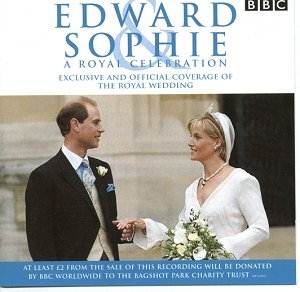
Royal weddings are rare occasions so it was obvious that in today's high-tech showbiz obsessed world, Prince Edward's wedding to the charming Sophie Rhys Jones was going to be a mammoth public relations event. After all the hype had died down, it was good to report that this album containing much beautiful music is also a charitable concern. However, we are principally concerned here with the music and that is quite outstanding.
Elgar makes a few appearances with the inspired 'Spirit of the Lord' particularly evocative whilst the usually rousing Handel pieces receive gloriously 'big-band' treatment - especially that timeless 'Amen' chorus. And the whole service is obviously a very moving experience as countless cheers add to the spice of the occasion especially when the couple pronounce their marriage vows. The organ music includes works by Widor, Harris and Bridge whilst there are also some specially composed pieces such as 'A Fanfare for Sophie' by David Cole.
The stirring speeches of the Bishop of Norwich, the Dean of Windsor and solemn prayers by the Rt. Revd David Connor make for striking listening. Roger Judd's organ playing is virtuosic but at the same time quite restrained whilst the Choir of St George's Chapel accredit themselves with aplomb under the direction of Jonathan Rees-Williams. All in all, this a souvenir of a splendid occasion although the video and probable DVD release will present a more complete 'package' for those all-important visuals.
Reviewer
Gerald Fenech
Sound:

Concept:

Richard Rodney BENNETT & John TAVENER Gormenghast Orchestral score by Richard Rodney Bennett, the BBC Philharmonic conducted by John Harle. Choral music by John Tavener, The Academy of Ancient Music conducted by Paul Goodwin, with The Choir of Temple Church directed by Stephen Layton. Title song sung by Andrew Johnson.
SONY SK89135 [67:20]
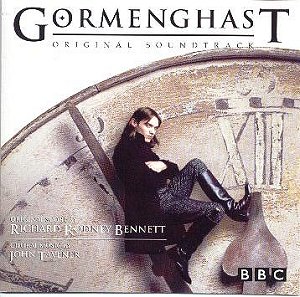
Gormenghast, the BBC adaptation of Titus Groan and Gormenghast, the first two books of an uncompleted sequence of novels by Mervin Peak, is a major television event. Though rather more of an event than it would have been had the BBC not long ago rejected its obligation to a balanced output of drama, including regular, serious, well-made and intelligent adult science fiction and fantasy. Hopefully, Gormenghast marks the beginning of the BBC starting to put things right, though more realistically, it will probably be something the BBC use as an excuse to do nothing else for the next 30 years.
For the moment though, via this lavish gothic fairytale the BBC is taking the fantastical seriously, for which no further evidence is required than to look at the names responsible for the music. Though not prolific, Richard Rodney Bennett is one of our finest film composers, his great score for Far From the Madding Crowd (1967) alone sufficient to rank him with the best. His music is conducted by the composer John Harle, himself a member of the Michael Nyman Orchestra, and who can currently be heard playing the saxophone on the soundtrack of The End of the Affair. The producers managed a further coup in signing one of the most acclaimed and popular contemporary 'classical' composers, John Tavener (which is not to say that Bennett does not also write concert music), to provide four choral pieces. Resolutely committed to the Greek Orthodox interpretation of the Christian faith, for decades virtually all of Tavener's works have been serious religious compositions, so engaging him for a television drama really is an achievement in itself.
Gormenghast is a vast, crumbling castle subject to arcane law and ruled by a detached and eccentric aristocracy. Published in the aftermath of the Second World War, there is clearly a large element of social satire, a commentary on a British Empire in decline looking back to better days. The drama is also informed by a certain orientalism of outlook, Peak having spent his childhood in a remote part of China, though this is more implicit than explicit. Accordingly, Bennett has fashioned a score solidly within the 20th century English classical tradition. Here is confident, imperious music, complete with a very strong main theme and regal fanfares such as aptly describes the imperial and noble nature of Gormenghast. The beautifully crafted and performed title song sets a text from Peak's books. Within this sound world is a rich, sultry musical fantasy, an exoticism which suggests the human desires locked within the monumental architectural and social structures. Inside this, is darkly brooding and inventively suspenseful dramatic writing which calls to mind Bernard Herrmann and his wonderful work for Jane Eyre or The Seventh Voyage of Sinbad and, Journey to the Centre of the Earth, without for a moment ever becoming derivative.
The range of orchestration is dazzling, for gorgeous harp and strings for the opening of 'Ceremony in the Rain', to the glittering panoply of percussion which runs throughout many of the tracks. 'The Death of Swelter' summons visions of John Williams scale epic action writing, while 'Irma's Romance' offers a waltz which may not surpass Bennett's own Murder on the Orient Express, but is certainly a fine companion. 'The Death of Steerpike' is a powerful finale, while the following funeral music and farewell bring the album to a thoroughly satisfying conclusion.
John Tavener's music illustrates the rituals which take-place on screen in various parts of the story. Three are new works, while one is adapted from music the composer wrote for his father's funeral. The arrangements are by Paul Goodwin. The music is characteristic of the composer, eloquent, beautiful, and strange by turns.
The sound throughout is superb, with a detail and clarity befitting a first class classical release, and the performances are magnificent. Television music has been improving immeasurably in recent years, and regardless of carping from certain quarters, Gormenghast is simply one of the finest scores ever written for the medium. The album is generously expansive, but not for a moment does it outstay its welcome, making it an absolutely essential release.
Reviewer
Gary S. Dalkin

HAMMER FILM COLLECTION Vol 2 GDI Records GDICD005
Distributed by ABM Tel: (0208) 236 2310 Fax: (0208) 236 2312
Save around 22% with
the retailers listed alongside

The original Hammer Film Collection release (GDICD002) brought such Perse delights as Franz Reizenstein's theme from "The Mummy", Malcolm Williamson's opening music from "Brides of Dracula" and Carlo Martelli's theme to "Curse of the Mummy's Tomb". The collection assembled on Volume 2 is in many ways even more attractive, including as it does John McCabe's evocative and beautifully scored theme "Echoes of the past" from the 1972 film "Fear in the Night". In the informative and copiously illustrated sleeve notes, John McCabe remembers that Hammer's music supervisor, Phil Martell was "a tower of strength and an inexhaustible supply of experience and advice". This is certainly borne out by the music itself - listen to the track without knowing who wrote it and you would swear it was by Hammer house composer James Bernard from the frantic, driving rhythms and the side drum and piccolo scoring which conclude the piece.
Malcolm Williamson provides a lush, Romantic score for the 1969 film "Crescendo" (at 4' 30" the most extended track on the CD) whilst Benjamin Frankel's classic ground-breaking twelve-tone score for "The Curse of the Werewolf" (1961) and Humphrey Searle's sombre, incantatory tolling theme for "The Abominable Snowman" make fascinating listening for British music lovers re-discovering these composers' substantial symphonic achievements on the CPO label.
Richard Rodney Bennett's evocative theme from the 1966 release "The Witches" provides another example of this composer's mastery of orchestration. Carlo Martelli's theme from the 1968 prehistoric romp entitled "Slave Girls" is much more subdued and delicately scored than the title of the film would suggest with its haunting cor anglais theme. James Bernard provides the backbone of the disc, as you might expect, with typically visceral music from such classics as "The Hound of the Baskervilles", "Frankenstein Created Woman" and "Plague of the Zombies".
Fun for Hammer aficionados and lovers of strong, charismatic film music alike, this CD's only weak point in an exciting and enjoyable release is the relatively short measure (less than 49 minutes). The booklet is full of stills from the original films and the CD itself is graced by a scene featuring the late Oliver Reed in hirsute mode from "The Curse of the Werewolf". Recommended.
Reviewer
Paul Conway

FRANZ REIZENSTEIN - Film Music for "The Mummy" GDI Records GDICD006. Distributed by ABM Tel: (0208) 236 2310. Fax: (0208) 236 2312. (57' 45'').
Save around 22% with
the retailers listed alongside
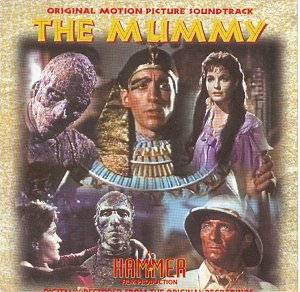
At just under an hour, this is the longest CD GDI Records have given us in their Hammer series. "The Mummy" is a wise choice for the company's first disc devoted to just one work and composer. It is a fine score (as endorsed by the sepulchral tones of Christopher Lee in a welcome brief introduction). It is a pity that Franz Reizenstein himself does not get bigger billing. His name does not appear anywhere on the cover of the CD or on the spine! Even on the back of the disc cover, his name is in far smaller print than the name of "Hammer" which is presumably what the distributors think will sell their product. Nonetheless GDI are to be congratulated for presenting all the music Reizenstein wrote for this 1959 quintessential Hammer production for there are many enjoyably atmospheric tracks on this CD. The "Opening Credits", "The Burial Procession", "John Banning and Mehemet Bey" and the "Finale and End Credits" could all stand on their own as inPidual mini-tone poems such is the depth to their powerful ideas. The film music itself forms a kind of extended orchestral suite with strongly characterised recurring themes, the most striking of which describes Kharis's love for Ananka and doubles as the Mummy's theme. The use of a wordless chorus here is decidedly (and gratifyingly) un-Hollywood such is the sincerity and indeed beauty of the writing. The primordial strength of the Egyptian-style music is not quite matched by the more dissonant parts of the score depicting the murderous events in England in where the Mummy is running amok. However, the imagination of the orchestration as exemplified by the skilful use of percussion to crank up the excitement impresses the listener and presages the composer's more lurid score to the Anton Diffring film "Circus of Horrors" of 1960. The sound on the "Mummy" disc is variable but never less than acceptable: indeed, it is remarkably good considering its late-1950s provenance.
Recommended to Hammer addicts (who will cherish the many splendid colour photographs in the handsomely produced booklet) and those interested in yet another émigré whose works have been unfairly neglected in recent years. I sincerely hope this will not turn out to be the only CD of the music of Franz Reizenstein to appear before the public - there are, amongst other works, two piano concertos, two piano sonatas, a cello concerto, a violin concerto, a concert overture "Cyrano de Bergerac", a radio opera "Anna Kraus" and an oratorio "Genesis" yet to receive commercial recordings.
Reviewer
Paul Conway

HISTORICAL
The CELIBIDACHE Edition - The Stuttgart Recordings Volume IV
Claude DEBUSSY (1862-1918)Nocturnes; La Mer; Ibéria (Images pour orchestre No. 2)
Maurice RAVEL (1875-1937)Daphnis et Chloé (Suite No. 2); La Valse; Le Tombeau de Couperin; Alborado del gracioso; Rapsodie espagnoleSWR Stuttgart Radio Symphony Orchestra conducted by Sergiu Celibidache
DG 453 194-2 3 CDs [163:28] with bonus CD containing La Mer rehearsals [47:59]
Save around 22% with
the retailers listed alongside
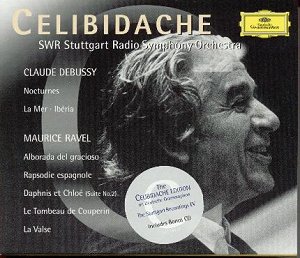
.
This set has been in and out of my CD tray countless times since my review copy arrived. I have sat captivated, marvelling at the wondrous shaping and detail of Celibidache's readings of Debussy and Ravel.
Without reiterating the comments I made in my review of the Richard Strauss and Respighi - Stuttgart Recordings Vol III, I would stress again his meticulous attention to every detail of the scores: dynamics, phrasing, and balance etc and his concern for complex textures to feel light and ultra-transparent. He adopts slower tempi than many rival conductors but the music never drags, as Patrick Lang comments, "His so-called slow tempi undoubtedly were a fundamental condition for allowing the sonorities to vibrate in all their fullness". Celibidache was concerned that sounds should ideally generate rather than follow each other, that his readings might be viewed as a musical tapestry growing organically with every element inter-related and perfectly balanced.
DEBUSSY
The cloud music of Nuages the first of the Nocturnes has a real feeling of tranquility and weightlessness but of isolation, too. Celibidache achieves this by allowing himself the freedom of not being shackled by a strict 6/4 pulse and allowing maximum expressiveness from Pided strings and cor anglais (English horn). Celibidache's Fêtes is certainly the "Brilliance of angry tambourines and sharp trumpet calls" as the lines go from one of Henri de Régnier's Poems Anciens et Romanesque that inspired this Debussy work. I played the third movement, Sirènes, over and over again, relishing the beauty of the women's voices that Debussy used so brilliantly as an extra orchestral instrument. The voices in unison or multi-part are sinuous and curving, distant then close; always seductively ravishing. Celibidache refines their strange sonorities by varying their vowel "a" from a closed "u" to an open "a", which also allows greater nuances in the articulation of the second theme.
La Mer illustrates "Celibidache's constant concern for what he called symphonic continuity"; how to integrate the contrast between surfaces of differing rhythms and instrumentation, how to give a sense of unity to a line that is Pided between several instruments playing in succession. Astonishing details are revealed in this way." There is "an inner calm and a natural long-breathed quality" to the music which allows La Mer to grow naturally, organically and make climaxes when they come all the more compelling. I would give just one example. Towards the close of the first movement, all is serene; one might visualise calm sea in mid-distance, the surface glinting brilliantly under a high sun; then a breeze stirs and you feel the water stir; a wave rises and grows in size and momentum as it comes towards the front of the sound stage to crash with considerable force immediately before us.
Ibéria.
Celibidache "repeatedly stressed that the chief difficulty in Debussy's score is not to lose oneself in the multiplicity of isolated "impressions" - small motifs, rapidly shifting colour combinations and characteristic movements - but always keep sight of the whole, which gives rise to inPidual roles and moments…What Celibidache admired in Debussy, among other things was his invention of a totally original language which he used with complete mastery from its very inception, no matter how daring the means; in particular he marvelled at colours never heard before - yet heard precisely by this composer -which lent Ibéria its unique brilliance and suggestiveness. One must marvel at how well Debussy captivates the Spanish idiom for he hardly ventured into that country travelling only to San Sebastian! The first movement, In the highways and byways, has an exotic and sultry flavour but the highlight is the perfect poise and pacing of the superb slow movement, 'Perfumes of the night' you can feel the soft breezes wafting delicate fragrances. Delicate glissandi, beautiful phrasing and the subtly evocative spread of sound with every ppp chord discernible yet optimally blended - this is a well-nigh perfect rendering including the inspired transition from the serenity of night to the soft daylight awakening and the increasing joyful frenzied celebration of the rhythmically fascinating and colourful Jour de fête.
RAVEL
Celibidache was always concerned to distinguish between the music of Debussy and Ravel. He felt it was inappropriate to lump together their two quite different musical personalities. Celibidache's reading of Ravel's Alborado del gacioso is a transparent shifting kaleidoscope of vibrant colour. The opening Prélude à nuit of Rapsodie Espganol is an exquiste balance of fine filigree detail - a sensuous evocation of a sultry night. The Malaguena has a proud spirit and swirl with a haughty upturned flourish at the end of certain phrases. The quiet, slow Habanera teases with its characterful glissandi and seductive glides and sultry purring woodwinds and suggestively low horns. The Feria is a faster and a riot of colour and rhythmic twists.
As a personality, Ravel was quite unemotional - on the surface. Accordingly and as Patrick Lang says in his booklet notes, " a concertgoer once remarked that Celibidache was neither a robot like Mravinsky nor an exhibitionist of feelings like Bernstein. His passion always flared up underground, but it was aristocratically restrained. This may explain why he was an incomparable Ravel conductor… "Don't get sentimental" he used to exhort his musicians during rehearsals, fighting down any tendency to isolated effects, to self-congratulatory rubato or vibrato as an end in itself. In the version of Ravel's second suite from Daphnis et Chloé, recorded here the chorus is absent. Celibidache's opening Lever du jour is a beautifully controlled and blossoming evocation of sunrise before reaching a brilliant fortissimo. As Lang comments, "this entire surface grows in intensity to attain an imposing grandeur, with all the larger and smaller articulations constantly drawing new breath organically, as though of their own accord." The playful, twittering woodwinds beautifully phrased and balanced against heady orchestrations, colour the voluptuous Pantomime. The concluding Danse générale is voluptuous and very thrilling with no sacrifice of clarity in the huge climaxes.
The smaller forms of the four movements of Le Tombeau de Couperin receive just as much attention and respect. In the opening Prélude Celibidache is concerned to balance a softness of string bowing to the delicacy of the woodwind writing, and the pastels of low flute, harp and horn, to achieve a playful poignancy that haunts. The Forlane here loses that mechanical impression that endangers so many rival performances; instead we have meticulous phrasing that floats the composition beguilingly. There is great refinement too in the playing of the Menuet.
Celibidache's reading of La Valse is real dance music. Whereas so many conductors are tempted to cast a satirical eye on this work and introduce sour notes, Celibidache's reading is a celebration of the Vienese waltz form - an affectionate and respectful homage. Again, quoting Lang, "…one can hardly cease admiring the translucence and far-sightedness with which Celibidache measures out the forces and, like an experienced dancer, how he always gives himself enough time to savour inPidual themes along the way -remaining true to his motto 'let it heat itself up' Therein lies one of his 'secrets': where most conductors press on to add urgency to the intensification, he tends to hold back, creating a degree of tension that he allows to discharge by itself at precisely the right moment, as though of its own accord and with tremendous force." "Like an experienced dancer", yes that's a key phrase for Celibidache phrases the music beautifully in accord with the dancers' grace, allowing the music to glide and accenting in exact synchronisation with their movements. This is a glorious evocation of an elegant formal ballroom; you feel that you can hear the swish of the ballgowns, the bustle and twitter of the guests on the periphery and the swirling colours and scintillating lights. It's all here. I really don't think I have heard La Valse played better.
The remaining rehearsal CD is a fascinating document and proves Celibidache's ceasless strivings for his perfection. Those with a grasp of the German language will clearly derive the most benefit from it but it is more or less a distillation of all the points made above.
A marvellous collection which is bound to figure highly amongst my records of the year.
An aside - if only Celibidache had conducted Arnold Bax!
Reviewer
Ian Lace

LEOPOLD STOKOWSKI - The Magician
various orchestras
RCA Red Seal - Artists of the Century series RCA 74321 70931 2 2 CD set (CD1 78.10+CD2 70.29) Mid price ADD
Save around 22% with
the retailers listed alongside
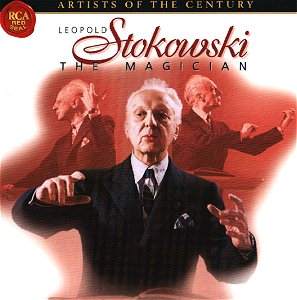
CD1
BACH Air on a G string; Wachet Auf *
BEETHOVEN Coriolan Overture *
LISZT Hungarian Rhapsody No. 2 **
WAGNER Magic Fire Music (RPO rec 1973)
SMETANA Vltava **
BRAHMS Academic Festival Overture ***
RIMSKY-KORSAKOV Russian Easter Festival Overture ****
RACHMANINOV Vocalise *****CD2
ENESCU Rumanian Rhapsody No. 1 **
VILLA-LOBOS Bachianas Brasileiras No. 5 *****
PROKOFIEV Romeo and Juliet (five numbers) ******
SHOSTAKOVICH Age of Gold (four numbers) ****LSO rec 1974 *
RCA Victor SO rec 1960 **
New Philharmonia rec 1974 ***
Chicago SO rec 1968 ****
American SO (with Anna Moffo - soprano) rec 1964 *****
NBC SO (members of) rec 1954 ******This is a nice set for those with caramel dentalwork. Each piece is lit and balanced with Stokowski's attention to the bigger technicolor picture and it is Stokowski's picture. The magic is in evidence in the balancings, adjustments and pacing of these familiar works. The recordings (1954-1973) are neon-illuminated but without undue glare. The oldest, Romeo, voluptuous indeed, is a performance in which every succulent drop is milked from the music. Frankly, though I enjoyed it, it is overdone to the point of saturated collapse (think of late Bernstein and then some!).
The Bach Air goes sweetly: no dawdling but predictably sheeny big band strings. The Winged Messenger gets under Stokowski's fingernails for the Shostakovich which goes cheekily. Stokowski's mainstream is successfully tapped in the exotic Rimsky and the naughty and cartoon-like Enesco. The Bach Wachet Auf, Wagner and Liszt are nondescript. I had better qualify that remark about the Stokowski mainstream. While, on disc, he is best known for mainstream Russian exotica (Scheherazade, Ilya Muramets and the like) his concert hall reputation was much broader. Of great value and taking up large parts of his concert programmes in Philadelphia (much to the horror of the matriarchal hegemony there) were his performances of contemporary American music.
Moffo is not among the very best but is still a paradigm by the side of the operatic Pas who have felt (or been told that they are) duty bound to immemorialise their interpretations. In the lovely Vocalise she struggled once but otherwise triumphed. Vltava has a lovely sense of ebb, flow and depth (offset by congestion during the loud passages) making us wonder about a complete Stokowski Ma Vlast. Coriolan (dramatic) and Academic Festival round off this generously timed and spirited collection - a tonic for those who want to slough off the politically correct. There is a brief and rudimentary scene-setting essay in three languages.
Reviewer
Rob Barnett

TOSCANINI CONCERT EDITION. Beethoven Symphony No 2 in D, Op 36; Symphony No 4 in B flat, Op 60; Overture Leonore No 3. With broadcast introductions and interval talk by Samuel Chotzinoff. NBC Symphony Orchestra, Arturo Toscanini.
Recorded at NBC on 4 November 1939 Naxos 8.110815-16 (2 CDs) [AAD] [95'].
Save around 22% with
the retailers listed alongside
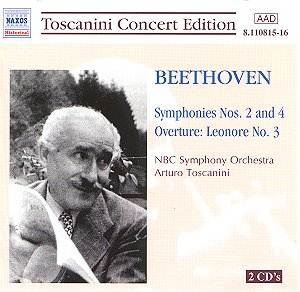
The restoration of these American broadcasts of sixty years ago are welcome. Their age means that the recordings are not perfect but, my goodness, the playing is.
Although a confirmed Beethovian, the Symphony No 2 has never been a favourite of mine largely because of the inane musical theme of the finale which is like a drunk taking a somersault. Listening to this I was struck by the similarities of the opening movement with the opening music of the ninth symphony. After the slow introduction, the allegro con brio is just that and played with splendid gusto. It was a revelation. The strings swirl like wild dervishes and the brass punctuation is electrifying. Here is noble proud music without the pomposity of Edwardian music and where an allegro is not a slow andante. The introductory adagio reveals much beauty from Toscanini and his orchestra which beauty I had not encountered before and the allegro matches the music for quality. The second movement is a larghetto which is a shade too fast for my taste but it is played with great elegance. It has a tenderness devoid of sentimentality. And how Beethoven developed his material rather than just repeat it over and over again as did Schubert. This movement is happy and, at this speed, rather playful. Memorable it certainly is. The scherzo is another happy movement quite at odds with Beethoven's anguish at his deafness. For Beethoven, life is still worth living despite cruel blows that occur. Again the speed is a little too fast but the result will please a lot of people. The conductor is really driving the orchestra.
And so to the finale. Once that silly opening theme is out of the way, the music develops in a stirring fashion and then that silly theme returns and after another fine exposition it returns for the third time. Some of the playing is a little exaggerated but doesn't it build up to a terrific climax.?
Beethoven's Symphony No 4 is a masterpiece. Berlioz's famous remark about the slow movement being so beautiful that no mortal man could have written it is well known. While I have heard it played better there is no denying the superlative quality of the piece. In the first movement's slow introduction there are a few quirky mannerisms and the sunny allegro has better advocates. But this is another performance of commitment and both the scherzo and finale have a wonderful sense of dash. I have always regretted Beethoven inserting that short slow passage towards the end of the finale since, as a consequence, the momentum is lost.
The Leonore No 3 Overture is given a thrilling performance. It is quite stunning at times. When Beethoven is played like this and not in the extreme styles of Klemperer and Karajan we are reminded of what a truly great composer he is. We have such an advocate today in Sir Roger Norrington.
I am not going to 'give stars' for performances and recordings because that would be difficult bearing in mind the vintage.
All I can say is that Beethoven is a genius and Toscanini a real maestro.
Reviewer
David C.F. Wright
TOSCANINI CONDUCTS BEETHOVEN. Symphony No 7; Septet, Op 20; Overture Egmont. NBC Symphony Orchestra, Arturo Toscanini.
Radio broadcast 18 November 1939. [AAD] [78' 51"] Naxos 8.110814.
Save around 22% with
the retailers listed alongside
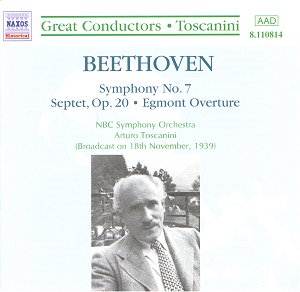
This disc is for connoisseurs of Toscanini. There are better performances and recordings of these pieces which show their vintage. Nonetheless they are workmanlike performances and have much to commend them.
Beethoven often became cross at people who made arrangements of his chamber works. The glorious Septet, Op 20 appeared in many guises in his lifetime and while was is due to its deserved popularity it fares best as Beethoven wrote it. Toscanini's arrangement is fundamentally for a larger number of strings and, as a result, the intimacy is gone.
But what a splendid piece it is. The tempo di minuetto is the composer's own reworking of the minuet from the Piano Sonata, Op 49 No 2. The scherzo is sheer joy but the intimate sparkle is not here.
The Egmont Overture is almost a miniature symphony and was often the subject of ridicule by Britten. But it is a good piece. The age of the recording has lost its freshness and exposed notes are very dry.
And so to the incredible Symphony No 7, probably Beethoven's finest. The opening poco sostenuto is a shade too slow but the first oboe has a beautiful tone. The mystery and expectation is effectively realised but the cello and double basses are too heavy bars 15ff. The oboe theme in bar 23 seems more romantic than classical and the recording cannot convey the brass punctuation at bar 34 ff. The transition from four time to 6/8 for the vivace is well caught but the tempo is a shade too slow and, unusually for Toscanini, his sense of rhythm is lost. Everyone loves the braying horns at 89 but the age of the sound does not convey this enough. The big repeat is omitted and why is it that some conductors interpret crescendo as an accelerando as well? This symphony often suffers from this unauthorised trait. In addition, Toscanini slows the tempo in the vivace at bar 309 to linger over the woodwind solos and then has to speed up to regain the correct tempo.
The allegretto starts with some poor wind intonation and the tempo isn't quite right but the counterpoint is brought out very well. The clarinet and horn duet at 117ff is quite ravishing and the fugal string passage is also well realised and the woodwind chords at 238ff are ravishing. The final four bars are exaggerated and stand out like a sore thumb but most conductors err here.
The scherzo is curious because the assai meno presto sections are so hurried. Some of the timpani passages needed more attack (bar 91ff, for example).
The finale begins a little sluggishly and we have to wait to about bar 330 before we have allegro con brio. In common with many conductors only the last 150 bars are played as Beethoven intended. There are no tempo variations in this movement so why is the 100 mph only reserved for the end? If Beethoven wants his 467 bars all at the same quick speed then that is what we expect.
As before, I cannot 'award stars' for performances and recordings for obvious reasons.
Reviewer
David Wright
TOSCANINI CONDUCTS BEETHOVEN. Choral fantasy for piano, chorus and orchestra; Symphony No 9 in D minor 'Choral'. Anita Dorfman (piano), Jamila Novotna (soprano), Kerstin Thorburg (contralto), Jan Peerce (tenor), Nicola Noscona (bass), Westminster Choir, NBC Symphony Orchestra, Arturo Toscanini
. Radio broadcast of 2 December 1939. Naxos 8.110824 [AAD] [80'].
Save around 22% with
the retailers listed alongside
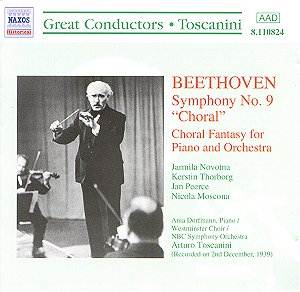
The Choral Fantasy is given a rather brisk performance at times and, as a consequence, it sounds a different piece. It sounds 'modern' to begin with, then takes on a Bachian clarity before the 'modern' sound resumes. Hints at the Third Piano Concerto follow and there is some really muscular playing. Sometimes the performance has a childlike quality. The choir is a little distant at time but there are some really exciting moments reminding us of the greatness of this music. The climaxes are very fine and gloriously robust.
The Choral Symphony is not an easy work to bring off and has suffered from some eccentric and awful performances over many years. The televised broadcast from Ely Cathedral under Simon Rattle over Christmas 1999 was one such occasion. Igor Stravinsky told us that he found the rhapsodic finale lacked cohesion and I can see what he means. I have yet to hear a performance where all the soloists are equally good and where the choir is in fine voice and where the conductor keeps it all together as one movement, rather than several linked episodes. I suppose I hear this work at least four times a year and have about 40 recordings. The soloists on Karajan's discs are probably the best but his conducting and additions to Beethoven's score rule these performances out.
Toscanini's finale develops into a very fine performance. It begins with a blaze but no fire, and highlights the stop and start dilemma. The age of the recording means that some important sustained notes are not. The interplay of the strings and the bassoon some three and a half minutes in is exquisite as is the following string cantilena. The first timpani entry before the introduction of the bass is stunning and the woodwind accompaniment in his first extended solo is a revelation. The opening vocal quartet passage may seem a little strange today since it shows how styles have changed in 60 years. In our day everything is so polished and this loses something of the uninhibited enthusiasm as here. One of the soprano's tessituras is another revelation and the tenors excel at the first big climax. The solo tenor I did not admire. He sounds like Allan Jones in the super Marx brothers film A Night At the Opera, rather light and sugary. The following orchestral passage is played concertante and this quick tempo makes the next entry of the chorus to be exciting and the timpanist is having a really good day!
I have always thought that the passage for tenors and basses in unison is weak but the sublime 'crying' strings that follow, which the chorus copy, is one of those utterly sublime moments in all music and beautifully realised here. The fugal passage is somewhat hesitant but packs a mighty punch and reveals orchestral detail rarely heard. The brass sometimes sounds as if it is playing Sousa and lacks polish ... if you will forgive the concealed joke. The soprano is simply stunning in the next vocal quartet and the singing is very moving indeed. The final pages are unbelievably good.
But, don't buy this performance because if you do you will see the flaws in the modern performances by famous conductors and it may change your perception of them.
What Toscanini shows us is that Beethoven was a genius and is, perhaps, the greatest composer of all time.
Heartily recommended!
Reviewer
David Wright
SPOKEN WORD
REALMS OF GOLD: The Letters and Poems of John Keats Read by Samuel West with Matthew Marsh
Naxos Audiobooks NA217412 158m DDD.
Save around 22% with
the retailers listed alongside
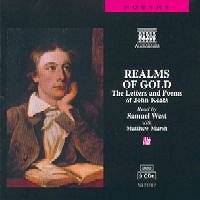
This is a profoundly beautiful collection that has so many moments of sheer unhallowed grief that I was close to tears many a time, surely a tribute to the potent force of the written word. Married with the timeless charm of Mendelssohn's piano music, Keats' poetry and writings almost spring from the speakers. In all Keats' famous poems such as 'Ode on a Grecian Urn', 'To Autumn' and many many others, a constant line of beauty runs through the narrative with effortless lyricism painting a picture of romantic genius. However my major discovery lay in these poignant letters, short stabs of grief-stricken melancholy by an astoundingly mature 25 year old. The letters to Keats' lover, Fanny Brawn are particularly beautiful, sheer despair and eternal longing permeate the lines with an almost tragical regularity. We are thrown headlong into Keats' last years and are made to suffer his wayward emotions and constant depression brought upon by ill-health and unfortunate circumstances. The poems that intersperse the narratives are all grandly romantic and one could not fail to understand that genius is constantly at work. Keats' preoccupation with death is also dealt with in most of his letters and one cannot but imagine the wrecked thoughts and destroyed ambitions running through the life that was slowly ebbing fast. As the last of the letters to Charles Brown fades away, we are intoxicated by the utter simplicity and beauty of 'When I have fears that I may cease to be', the final calling card of a life that lives on in this cruel world with the potency of love. Samuel West is an ideal advocate for this collection, his reading is dramatic but not overtly so and Matthew Marsh's sobre narration carries a hint of the ever impending doom. I imagine Keats on his deathbed, at last he had his wish, to go to the country where all troubles and heartache are indeed laid to rest and where he could enjoy the dreams with his beloved in the solitude of paradise.
Reviewer
Gerald Fenech
Reading:
Effects:

BOOK REVIEWS
The Penguin Guide to Compact Discs (1999) By Ivan March, Edward Greenfield and Robert Layton Paperback - 1600 pages (November 1999) Penguin Books; ISBN: 0140513795
£19.99 (Amazon UK £13.60)
Save around 22% with
the retailers listed alongside.
The latest version of this indispensable publication is subtitled “The Guide to Excellence in Recorded Classical Music”. In the forward the author’s remark that the current survey gathers together the very finest CDs issued over the last sixteen years. They have survived in the catalogue because their excellence is recognised; if deleted it is unusual for them to remain outside the catalogue for very long. They also consider that the majority of the very best discs are at premium price and are worth it — this is a view that perhaps not every record collector will hold.Under the editorship of Ivan March, this series of books started as the Stereo Guide in the early days of stereo records. The original team included Edward Greenfield and Dennis Stevens, then Robert Layton joined; later Dennis Stevens had to give up. When the early versions were published, the situation regarding the issue of classical recordings was reasonably stable. Nearly all were issued by a handful of major record companies (EMI, DGG, Decca, Philips, CBS, RCA) alongside a relatively small number of independent companies. The CD era, after a slow beginning, brought a massive expansion of sales as the majority of collectors changed their LP collections to the CD format, this coincided with a general increase in interest in classical music and also increased prosperity. This early success of the new medium was dominated by the major companies who were also able to sell massive numbers of re-issues of older tracks which in many cases sounded much better than the original LP and were comparable in sound quality to new issues. A number of independent companies, notably Chandos and Hyperion, were very successful in choosing imaginative repertoire combined with high quality of recordings and they continue to be successful at full price.
However the economic downturn in the early nineties also led to a catastrophic downturn in influence of the major companies in the classical field. Traditionally these companies had relied upon emphasis on artists rather than repertoire for their sales but this policy was no longer successful as few collectors were interested in replacing their CDs of artists like Karajan and Beecham with modern artists — especially at a premium price. The other great success story was Naxos. This company originally came to fame when it sold CDs at less than a fiver in stores such as Woolworth. At first, their recordings used mainly unknown eastern European orchestras with conductors with unpronounceable names. Increasingly however, Naxos expanded both their repertoire and range of artists, their recordings also improved. Now Naxos dominates the shelves of the classical section of most record shops and increasingly people are unwilling to pay two or three times as much for CDs which often are seen as being only marginally better.
This new Penguin Guide thus serves as an invaluable review of the work of the record majors which often still comprise the best of the standard repertoire and will not readily go out of date. Companies like Hyperion (e.g. with their excellent romantic piano concerto series) and Chandos (e.g. with their Opera in English series) have little or no competition in their chosen new repertoire although Naxos are now extending their recordings more widely than would have predicted a few years ago. When choosing a recording, the Penguin Guide is always my first step and over the years the authors have gained a well deserved reputation for consistency and excellence. It will be very rare for you to be disappointed with recordings praised by them even though inevitably personal taste will not always coincide with all the judgements. The one problem which can arise is a result of the policy of concentrating on excellence — when a particular available recording is not reviewed, the reader does not know whether it is not there because of an oversight or because it was thought to be so poor as not to warrant a review (however this is seldom a serious problem in practice).
The authors continue to award one of their now famous Rosettes to a limited number of recordings. A Rosette is a quite arbitrary compliment by a member of the reviewing team to a performance which seems very special or illuminating. Many have been awarded to very well known indisputably special performances. In a few cases however I do have reservations, for example the Rizzi version of Gounod's Faust is a fine modern recording - but is the conducting as good as Beecham's? The Guide is especially useful in its treatment of historical recordings. There has been an increased interest in re-issues of old recordings including many which go well back into the days of the 78. In addition to re-issues by the major companies, a number of small specialist enterprises (of which Dutton Laboraties is especially esteemed) are now producing historical recordings of a quality which can only be described as magical. This Guide is particularly helpful in putting these CDs into context alongside modern recordings rather than keeping them as a special category.
This Penguin Guide has been a massive undertaking, with 1637 pages of closely written material in a new double column format which allows the review of even more recordings than before. Not everything is included — this would be impossible. But the judgements are good, the writing clear and the information reliable and accurate. This is a ‘must have’ for any serious collector of classical recordings.
Reviewer
Arthur Baker
In a publication of this size and complexity one might expect some errors. It is particularly unfortunate that this issue lists the Première recording of Ruth Gipps 2nd Symphony coupled with Arthur Butterworth's First symphony, ClassicO CLASSCD 274 and in both occurrences the composer has been listed as Gibbs. see CD review.
Len Mullenger
[Part 1]
[Part 2]
[Part 3]
[Part 4]
[thumbnails]
[previous]
 |
Search the Crotchet database from here |
| Discs
on these pages are offered for sale. There is also a page of search
engines from a selection of on-line retailers
here.
Please support this web-site by buying your discs here. Disclaimer: Every effort is made to make sales links to the correct disc but, in the end, you must take responsibility for checking that what you are purchasing is what you want. Some of these discs were not actually available for sale at the time of posting but a link has been made in anticipation of their forthcoming availablility. Any opinions expressed in reviews or articles on this site are those of the author and do not necessarily represent the views of the site owner, Len Mullenger or the Editors. Reviewers and authors retain copyright in their work unless it has been paid for or commissioned by the site owner. All prices, special offers etc relate to the month of publication only or as stated. |
Return to Index of Classical Reviews